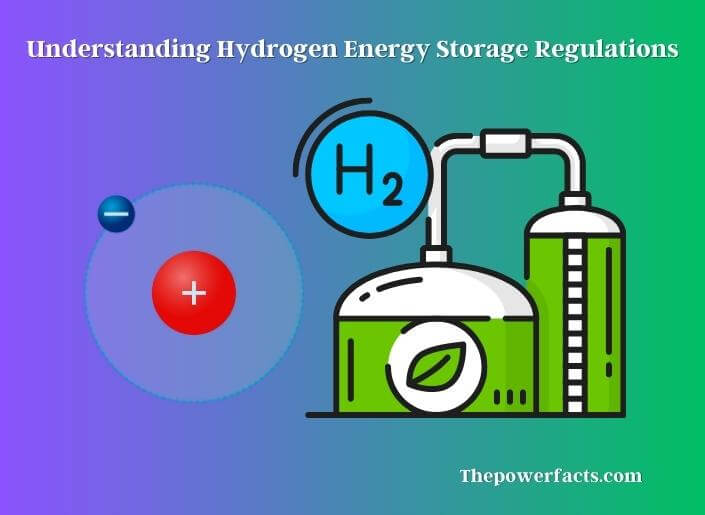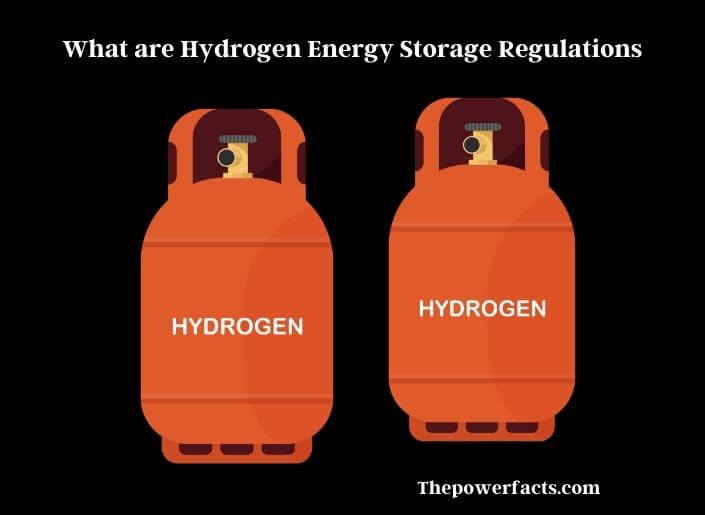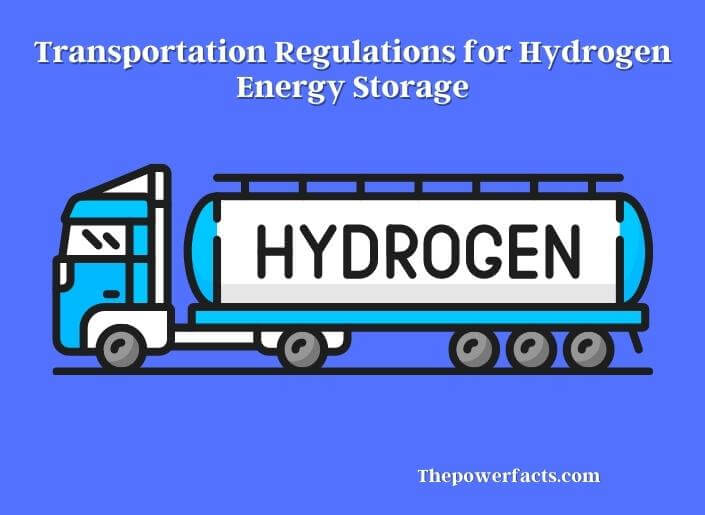Hydrogen energy storage is a crucial technology that has the potential to revolutionize the energy industry. With the increasing demand for clean and sustainable energy sources, hydrogen energy storage has emerged as a viable solution for storing excess energy generated from renewable sources like wind and solar power. Hydrogen energy storage is still a relatively new technology, and there are several regulations that govern its storage, handling, and transportation. These regulations aim to ensure the safety and efficiency of hydrogen energy storage and to minimize the risks associated with its use.

Understanding hydrogen energy storage regulations is essential for anyone involved in the energy industry. From energy companies to government bodies, understanding the regulations that govern hydrogen energy storage is critical to ensuring the safe and efficient use of this technology. These regulations cover a wide range of topics, including safety guidelines for the design, installation, and operation of hydrogen energy storage systems, storage regulations for the proper handling and storage of hydrogen energy, and transportation regulations for the safe and efficient transportation of hydrogen energy.
As the use of hydrogen energy storage continues to grow, emerging regulations are being developed to address new and innovative technologies that store hydrogen energy. These emerging regulations are focused on integrating hydrogen energy storage with renewable energy sources, like wind and solar power, and promoting the use of clean and sustainable energy.
What are Hydrogen Energy Storage Regulations?
Hydrogen energy storage regulations are a set of guidelines and standards that govern the storage, handling, and transportation of hydrogen energy. These regulations are put in place to ensure the safety and efficiency of hydrogen energy storage and to minimize the risks associated with its use.
The regulations cover a wide range of topics, including safety guidelines for the design, installation, and operation of hydrogen energy storage systems, storage regulations for the proper handling and storage of hydrogen energy, and transportation regulations for the safe and efficient transportation of hydrogen energy.

Hydrogen energy storage regulations are developed and enforced by various government agencies and organizations, including the Department of Energy, the Environmental Protection Agency, and the National Institute of Standards and Technology. The regulations are regularly updated to address new and emerging technologies and to promote the safe and efficient use of hydrogen energy.
Understanding hydrogen energy storage regulations is essential for anyone involved in the energy industry. Energy companies, government bodies, and other stakeholders must comply with these regulations to ensure the safe and efficient use of hydrogen energy. Failure to comply with the regulations can result in fines, legal penalties, and other consequences that can harm both individuals and businesses.
Safety Regulations for Hydrogen Energy Storage
Safety regulations for hydrogen energy storage are essential to minimize the risks associated with the handling, storage, and transportation of hydrogen energy. These regulations are put in place to ensure that hydrogen energy is stored and used in a safe and efficient manner.
Design and Installation Regulations
Regulations for the design and installation of hydrogen energy storage systems aim to ensure that the systems are designed and installed to the highest safety standards. These regulations include guidelines for the use of materials and equipment, as well as the placement and ventilation of storage tanks.
Operating Regulations
Operating regulations focus on the safe and efficient operation of hydrogen energy storage systems. These regulations cover the procedures for starting and stopping the systems, as well as the maintenance and repair of the systems. They also include guidelines for the safe handling of hydrogen, including the use of protective equipment.
Storage Regulations
Storage regulations cover the safe handling and storage of hydrogen energy. These regulations include guidelines for the storage of hydrogen in compressed or liquid form, as well as the handling and disposal of waste materials.
Transportation Regulations
Transportation regulations cover the safe and efficient transportation of hydrogen energy. These regulations include guidelines for the design and construction of transport vehicles, as well as the safe handling and transport of hydrogen fuel.
Note
Safety regulations for hydrogen energy storage are essential for the safe and efficient use of this technology. Compliance with these regulations ensures that hydrogen energy is handled, stored, and transported in a manner that minimizes the risks to individuals and the environment.
Storage Regulations for Hydrogen Energy Storage
Storage regulations for hydrogen energy storage are a critical aspect of ensuring the safe and efficient handling and storage of hydrogen energy. These regulations cover the procedures and guidelines for the proper handling, storage, and disposal of hydrogen fuel.
One of the primary storage regulations for hydrogen energy storage is the requirement for proper storage containers. Hydrogen can be stored in compressed or liquid form, and the containers used to store hydrogen must be designed and constructed to the highest safety standards. These containers must be able to withstand high pressure and must be equipped with safety features such as pressure relief valves and safety interlocks.
Another storage regulation for hydrogen energy storage is the requirement for proper ventilation. Because hydrogen is highly flammable, storage areas must be well-ventilated to prevent the buildup of hydrogen gas. Proper ventilation ensures that any hydrogen gas that may escape from storage containers is quickly dispersed, reducing the risk of a fire or explosion.
Storage regulations also cover the handling and disposal of waste materials associated with hydrogen energy storage. These regulations require that any waste materials, including containers and other equipment, be properly disposed of in accordance with local, state, and federal regulations.
Storage regulations for hydrogen energy storage may also cover the monitoring and inspection of storage containers and equipment. Regular inspections ensure that storage containers and equipment are in good condition and functioning properly, reducing the risk of leaks or other safety hazards.
Transportation Regulations for Hydrogen Energy Storage
Transportation regulations for hydrogen energy storage are essential to ensure the safe and efficient transport of hydrogen fuel. Hydrogen can be transported in compressed or liquid form, and the transportation of hydrogen fuel presents unique safety challenges that must be addressed through regulations.

Vehicles used to transport hydrogen fuel must be designed and constructed to the highest safety standards. This includes the use of specialized containers or tanks that are designed to withstand the high pressure of compressed hydrogen or the low temperature of liquid hydrogen. These transport vehicles must also be equipped with safety features such as pressure relief valves and safety interlocks.
Another transportation regulation for hydrogen energy storage is the requirement for proper labeling and marking of transport vehicles. Vehicles used to transport hydrogen fuel must be clearly marked with the appropriate hazard labels and placards to inform drivers and emergency responders of the potential hazards associated with hydrogen fuel.
Transportation regulations also cover the handling and disposal of waste materials associated with the transport of hydrogen fuel. These regulations require that any waste materials, including containers and other equipment, be properly disposed of in accordance with local, state, and federal regulations.
It may also cover the training and certification of personnel involved in the transport of hydrogen fuel. Proper training ensures that personnel is knowledgeable and competent in the safe handling and transport of hydrogen fuel.
Emerging Hydrogen Energy Storage Regulations
As the use of hydrogen energy storage continues to grow, emerging regulations are being developed to address new safety and environmental concerns. These regulations aim to ensure that hydrogen energy storage is used in a manner that is safe and sustainable, while also promoting innovation and growth in the industry.
One emerging regulation for hydrogen energy storage is the requirement for carbon capture and storage (CCS) technologies. CCS technologies are used to capture carbon dioxide emissions generated during the production of hydrogen fuel, which can then be stored underground or used in other industrial processes. By requiring the use of CCS technologies, emerging regulations aim to reduce the environmental impact of hydrogen energy storage and promote the use of low-carbon hydrogen.
Another emerging regulation for hydrogen energy storage is the development of safety standards for hydrogen fueling stations. As the number of hydrogen fueling stations continues to grow, emerging regulations aim to ensure that these stations are designed and constructed to the highest safety standards. This includes the use of specialized equipment and safety features, as well as regular safety inspections and training for personnel.
Emerging regulations for hydrogen energy storage may also address the use of renewable energy sources to produce hydrogen fuel. By promoting the use of renewable energy, emerging regulations aim to reduce greenhouse gas emissions and promote the development of a sustainable hydrogen economy.
These regulations may include standards for the design and construction of fuel cells, as well as requirements for the safe handling and disposal of waste materials associated with fuel cell production and use.
Benefits of Hydrogen Energy Storage Regulations
Hydrogen energy storage regulations offer a wide range of benefits, including increased safety, improved environmental performance, and increased investment in the hydrogen energy sector. Below are some of the key benefits of hydrogen energy storage regulations:
Enhanced safety: Regulations ensure that hydrogen energy storage and transport are conducted in a safe and responsible manner, minimizing the risks associated with handling and storing hydrogen fuel. This includes requirements for safe storage containers, transportation vehicles, and fueling stations, as well as training for personnel involved in the industry.
Improved environmental performance: Regulations encourage the use of low-carbon hydrogen, which is produced using renewable energy sources or carbon capture and storage technologies. By promoting the use of low-carbon hydrogen, regulations help reduce greenhouse gas emissions and improve air quality.
Increased investment: Clear and consistent regulations create a more stable regulatory environment, encouraging investment in the hydrogen energy sector. This investment can help drive innovation and growth in the industry, leading to new technologies and improved performance.
Economic benefits: Hydrogen energy storage regulations can also provide economic benefits by creating jobs and supporting local industries. As the hydrogen energy sector continues to grow, new opportunities for job creation and economic development may emerge.
Energy security: Hydrogen energy storage regulations can help improve energy security by providing a reliable and flexible source of energy storage. This can help reduce reliance on fossil fuels and improve resilience in the face of disruptions to traditional energy sources.
Wrapping Up a Conclusion
Understanding hydrogen energy storage regulations is critical for ensuring the safe and sustainable use of this important technology. As the hydrogen energy sector continues to grow, regulations will play an increasingly important role in promoting innovation, enhancing safety, improving environmental performance, and supporting economic growth.
If you comply with these regulations, industry stakeholders can help ensure that hydrogen energy storage continues to be a reliable and effective means of storing and utilizing energy. They can also help promote a cleaner, more sustainable energy future by reducing greenhouse gas emissions and promoting the use of low-carbon hydrogen.
As emerging regulations continue to be developed, it will be important for stakeholders to stay informed and engaged in the regulatory process. This includes participating in public consultations, providing feedback on proposed regulations, and working collaboratively with regulators to promote the responsible and sustainable use of hydrogen energy.